Artificial Intelligence in Sales: Its Role for B2B Growth in 2025
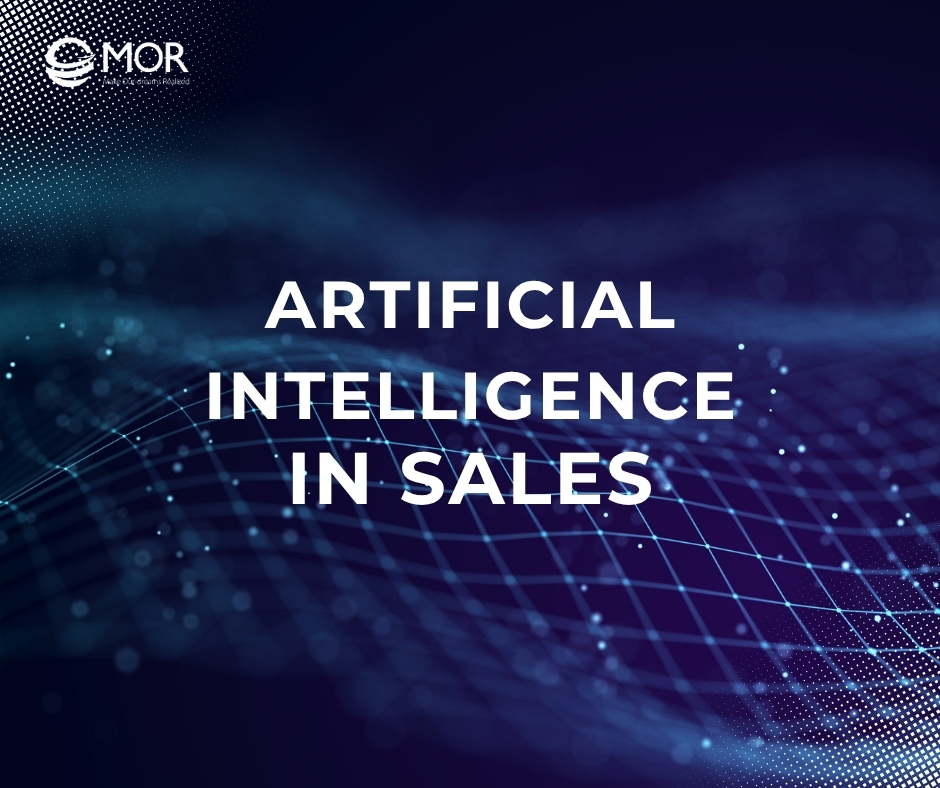
B2B sales teams are under pressure. Deals take longer. Buyers want more control. And traditional tactics? They’re running out of steam. Artificial intelligence in sales is no longer a ‘nice-to-have’. It’s becoming the engine behind faster pipelines and smarter selling. This MOR Software’s guide will explain how AI fits into sales, what it does, and why it matters for B2B growth in 2025.
Understanding Artificial Intelligence in Sales
Before we talk about what AI does in sales, we need to be clear on what it is. MOR Software will lay the groundwork here, so you’ll move into the next sections with clarity and confidence.
What is Artificial Intelligence in Sales?
Artificial intelligence in sales refers to systems that use data and algorithms to support or automate parts of the sales process. These tools don’t just follow scripts. They learn from past performance and adapt in real time. Think of AI as a virtual sales assistant that handles everything from qualifying leads to predicting what deals are most likely to close.
Unlike manual methods, AI systems scan vast datasets quickly. They recognize patterns that most reps wouldn’t spot. This gives teams more than just a list of leads. It gives them insights on when to reach out, how to approach each account, and what messages are most likely to get a response.
AI doesn’t replace sales reps. It supports them. It handles repetitive tasks, fills in data gaps, and keeps processes moving behind the scenes. That’s why artificial intelligence in sales is getting more attention in industries where timing, precision, and personalization matter.
Key AI Technologies: Machine Learning, NLP, Predictive Analytics
The tech behind artificial intelligence in sales might sound complex, but it boils down to three core parts:
- Machine learning (ML) teaches systems how to improve from experience. The more data the model processes, the better it gets. In sales, ML powers lead scoring, pricing suggestions, and revenue forecasting. For example, an ML model can flag leads that resemble past customers who converted quickly and at higher value.
- Natural language processing (NLP) is what helps AI read, understand, and generate human language. It powers tools like AI email assistants, chatbots, and even call transcriptions. A sales rep can use NLP-powered tools to scan customer emails for sentiment, track objections, or get real-time coaching during a call.
- Predictive analytics applies statistical models to forecast outcomes. It helps teams spot trends, flag risk, and plan around buyer behavior. When integrated into a CRM, predictive tools can surface the deals most likely to close this quarter. Or, they can alert teams when buyer engagement drops, giving them time to intervene.
All three of these technologies feed into each other. NLP gives structure to unstructured data. ML trains models on that data. Predictive analytics helps teams make sense of it fast. This trio is what makes artificial intelligence in sales and marketing so valuable, especially when speed and timing matter.
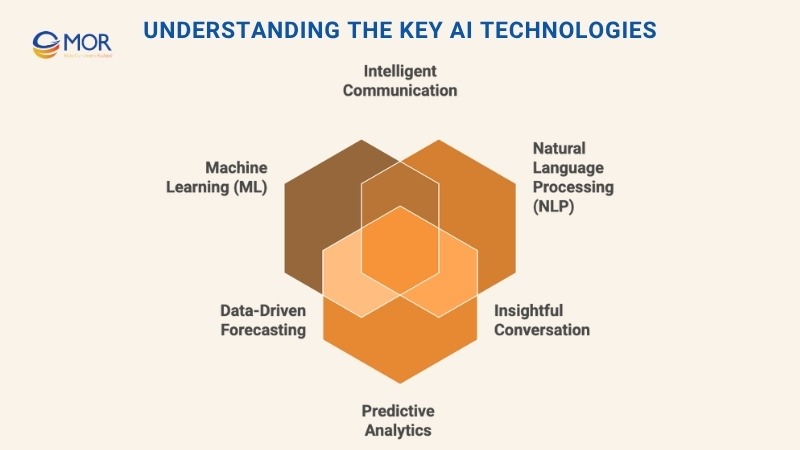
Key AI Technologies: Machine Learning, NLP, Predictive Analytics
How AI integrates With Traditional B2B Sales Processes
AI doesn’t work in a vacuum. It plugs into tools teams already use, like CRMs, marketing platforms, and sales dashboards. When built right, it acts like an invisible co-pilot. It scores leads as they come in, suggests next steps based on deal history, and flags when an account is ready for outreach.
In traditional B2B sales, reps rely on gut feeling and manual input. AI adds structure. It fills in blanks, tracks patterns, and keeps everything aligned with business goals. For sales managers, this means clearer forecasting and better coaching. For reps, it means spending less time on admin and more time selling.
Artificial intelligence in marketing and sales works best when paired with human intuition. AI handles the grunt work. Reps bring the nuance. Together, they close better deals faster.
Why Artificial Intelligence in Sales Matters for B2B Companies
MOR Software will walk you through why this shift isn't just hype. You’ll see how smart B2B teams are already using AI to gain speed, clarity, and stronger pipelines.
Data-backed Benefits: Productivity, Revenue, and Efficiency Gains
The numbers say it all. According to McKinsey, companies using artificial intelligence in sales report up to 50% increase in leads and 40–60% cost savings on customer acquisition. Reps spend less time chasing the wrong accounts and more time talking to buyers who are ready to act.
HubSpot’s 2024 Sales Report shows that Sales pros save about 2 hours 15 minutes a day by off-loading data entry, scheduling, and note-taking to AI and automation. That’s time they can reinvest in building relationships, closing deals, or refining their outreach strategy.
Revenue benefits aren’t hypothetical either. Salesforce found that 81% of sales teams are already testing or running AI, and 83% of those teams grew revenue last year versus 66% without AI. Add better forecasting, cleaner data, and faster follow-ups to the mix, and the math works in your favor.
Shifting from Manual to Automated, Sata-driven selling
Traditional sales is time-consuming and full of guesswork. Spreadsheets, outdated CRMs, and scattered notes make it hard to stay consistent or scale. Artificial intelligence in sales and marketing flips that model. It connects data points across tools, automates outreach, and updates CRM entries in real time.
AI also scores leads as soon as they come in. It tells your reps who to prioritize and when. Instead of cold calls, they focus on warm leads with clear intent signals. That means shorter sales cycles and higher conversion rates.
You don’t need a massive sales ops team to make this work. Even lean B2B teams can train an AI model to surface next-best actions or highlight deals at risk. This kind of automation doesn’t just ‘save time’. It sharpens the whole sales process.
AI as a Competitive Advantage in the B2B Space
In B2B, where sales cycles are long and deals are complex, AI in sales helps companies move faster and smarter. It turns scattered data into actionable insights. It eliminates blind spots. It empowers reps with real-time prompts, not static scripts.
Most important: it’s getting harder to compete without it. As more B2B firms adopt AI in sales and marketing, those that stick to outdated processes risk falling behind. Better yet, teams that adopt early often find themselves leading the pack.
Want your team to do more with less friction? Artificial intelligence in sales isn’t a gamble. It’s a gear shift.
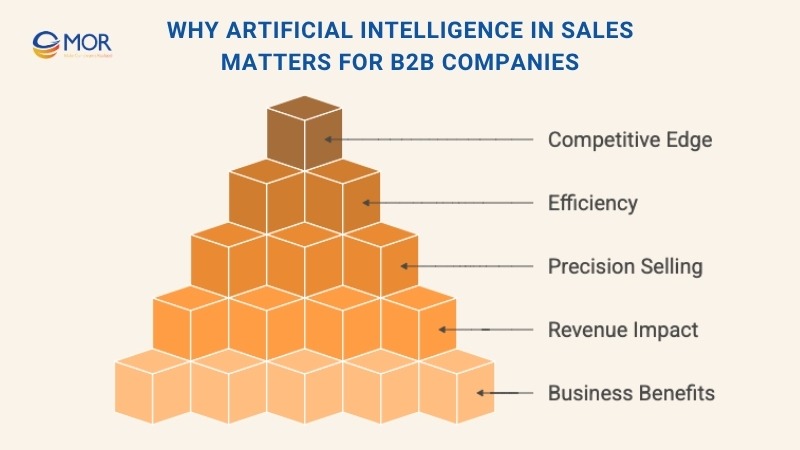
Why Artificial Intelligence in Sales Matters for B2B Companies
Core Applications of Artificial Intelligence in Sales
You’re about to see four key ways AI helps real sales teams work faster and smarter every day. We will show you how each area works, so you’ll recognize which use cases make the most sense for your own B2B strategy.
Lead Generation and Qualification
Finding the right prospects takes time. But artificial intelligence in sales cuts through the noise with real-time targeting and smarter scoring.
- Predictive analytics helps identify which leads are most likely to convert. AI models look at past customer behavior, firmographics, and engagement signals to flag high-intent accounts before a rep ever picks up the phone.
- AI-powered lead scoring assigns a value to each prospect based on how closely they match your ideal customer profile. Instead of relying on gut instinct, reps get a ranked list of leads based on actual data.
- Segmentation at scale becomes possible when AI clusters leads into buckets: by company size, industry, deal size, or behavior. This lets sales and marketing teams run more targeted campaigns without hours of manual work.
AI isn’t just generating names. It’s qualifying them, ranking them, and prepping them for conversion. That’s why B2B teams using ai in sales and marketing see higher pipeline quality and fewer wasted touchpoints.
Sales Forecasting and Pipeline Management
Forecasting isn’t guesswork anymore. Artificial intelligence in sales combines historical data with live deal updates to build forecasts that are grounded and timely.
- Historical and real-time data get merged to build more reliable sales predictions. AI learns from past wins and losses, then layers in current buyer activity to fine-tune expectations.
- Deal scoring gets smarter over time. AI tools weigh factors like buyer engagement, sales stage velocity, and even competitor mentions to assess the likelihood of closing.
- Sales dashboards powered by AI give teams daily visibility. Instead of static reports, reps and managers see live updates on deal health, rep performance, and goal progress.
These insights help leaders course-correct early. If a region is lagging or a product line isn’t converting, you’ll know fast and act faster. For B2B companies juggling long cycles and large deals, this clarity is a game changer.
Personalized Customer Engagement
Buyers expect more than generic emails. They want messages that speak to their needs. That’s where artificial intelligence in sales and marketing steps in.
- AI-driven personalization lets reps send emails and messages tailored to each account. AI can rewrite subject lines, suggest content, or time outreach based on when a buyer is most likely to engage.
- Smart follow-ups get triggered automatically based on buyer behavior. If someone clicks a product page or opens a proposal, AI sends a relevant message or nudges the rep to follow up.
- Chatbots and virtual assistants give B2B websites 24/7 support. These tools can answer questions, qualify leads, and route them to the right sales contact, all without human input.
The result: better engagement, more qualified conversations, and less manual effort. That’s why AI B2B marketing is shifting from experiment to standard practice.
Sales Automation and Workflow Optimization
Sales reps spend too much time logging calls, updating CRMs, and scheduling meetings. Artificial intelligence in sales takes care of the busywork.
- Routine tasks get automated. AI tools fill in CRM fields, log meeting notes, and track customer touchpoints without reps lifting a finger.
- AI scheduling assistants sync calendars, suggest meeting times, and send reminders. This keeps the back-and-forth to a minimum and helps deals move faster.
- Workflow alerts notify teams when a lead goes cold, a proposal isn’t viewed, or a contract is stuck in legal. AI doesn’t just manage tasks. It helps teams act in the right moment.
By automating low-value tasks, AI gives reps time back. That means more calls, more demos, and more closes. McKinsey finds that AI adoption lifts sales ROI by 10–20% on average, and can automate roughly 20% of a rep’s routine tasks.
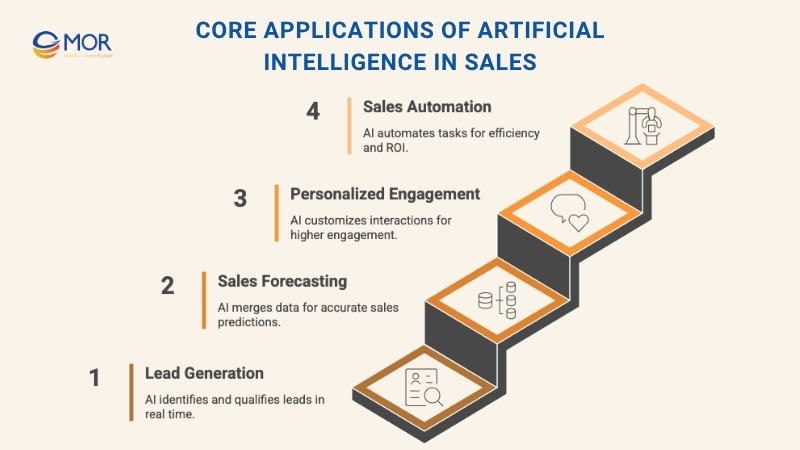
Core Applications of Artificial Intelligence in Sales
Real-World Success Stories: Artificial Intelligence in Sales
Now it's time to see what this looks like in real business settings.
Rogers Communication – Improved Lead Conversion and Productivity
Rogers faced growing pressure to handle a high volume of customer inquiries while keeping sales teams focused on closing deals. Traditional channels were slow and often resulted in dropped leads or delayed responses.
The company integrated AI-powered chatbots into its sales workflows. These bots managed first-touch interactions, answered common questions, and routed qualified leads to the right rep automatically. To enhance performance further, Rogers deployed the SalesChoice Insight Engine to strengthen forecasting and risk analysis.
Results:
- 80% forecast accuracy
- 90% early-loss prediction accuracy
- Sales teams closed deals faster and spent more time on high-value accounts
Sephora – Enhanced Customer Segmentation and Engagement
Sephora struggled to scale personalized shopping experiences across digital and in-store touchpoints. With a wide product catalog and varied customer base, traditional segmentation couldn’t keep up.
The team deployed an AI-powered recommendation engine. It analyzed customer behavior across web, email, and POS systems, then personalized product suggestions in real time.
Results:
- 5–15% increase in revenue from personalized recommendations
- Higher online and in-store conversion rates
- Notable growth in upselling and cross-selling opportunities
Verizon – Sales Acceleration with Google AI Assistants
Verizon needed to improve both efficiency and sales outcomes across its massive 28,000-person service team. Traditional support workflows made it difficult for customer service agents to both assist customers and drive conversions at scale.
In response, the company deployed an AI assistant built using Google’s Gemini large language model. The tool helps agents respond to customer inquiries faster, provides real-time suggestions, and frees them up to focus on upselling.
Results:
- Nearly 40% increase in sales performance since AI deployment
- Reduced call handling times across service teams
- Scaled AI assistant support to tens of thousands of agents without increasing headcount
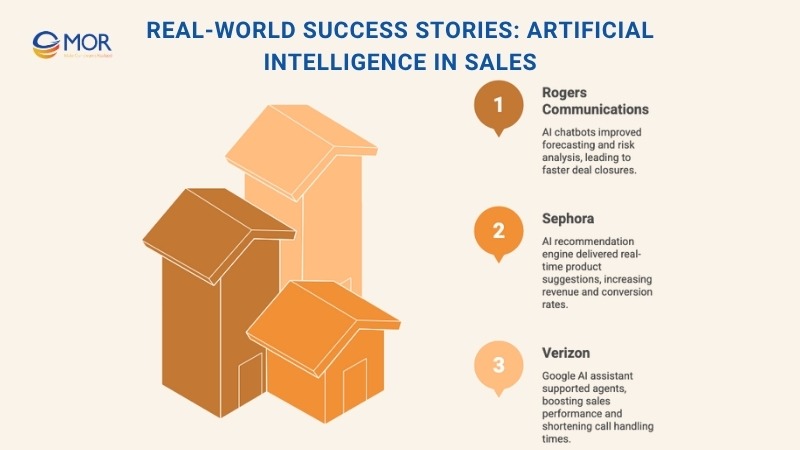
Real-World Success Stories: Artificial Intelligence in Sales
How to Start With Artificial Intelligence in Sales
You don’t need to rebuild your sales engine to bring in AI. Start small, stay focused, and scale with purpose. Here's how:
1. Audit current sales process
Map your workflows. Look at where reps spend time, where leads drop off, and which tasks slow things down. Common gaps include: poor lead routing, inconsistent follow-ups, and missing CRM data.
2. Define goals
Decide what success looks like. Do you want faster lead response times? Better forecasting? More deals closed per rep? Clear goals help you pick the right tools and measure the right metrics.
3. Choose tools
Pick AI sales tools that fit your size and systems. Look for platforms that integrate with your CRM, support your team’s daily habits, and solve your biggest pain points. Popular options include AI chatbots, email assistants, and forecasting software.
4. Pilot test
Roll out the tool to a small group or team. Track usage and performance closely. Look for early wins and friction points. Use these insights to refine your plan before expanding.
5. Train your team
AI works best when people know how to use it. Run hands-on training sessions. Show reps how the tool helps them, not replaces them. Build confidence early.
6. Measure and iterate
Track results. Look at adoption rates, time saved, pipeline health, and quota attainment. Share success stories to drive buy-in. Refine your setup based on feedback and performance.
Artificial intelligence in sales is a long game. But each step moves your team closer to smarter selling.
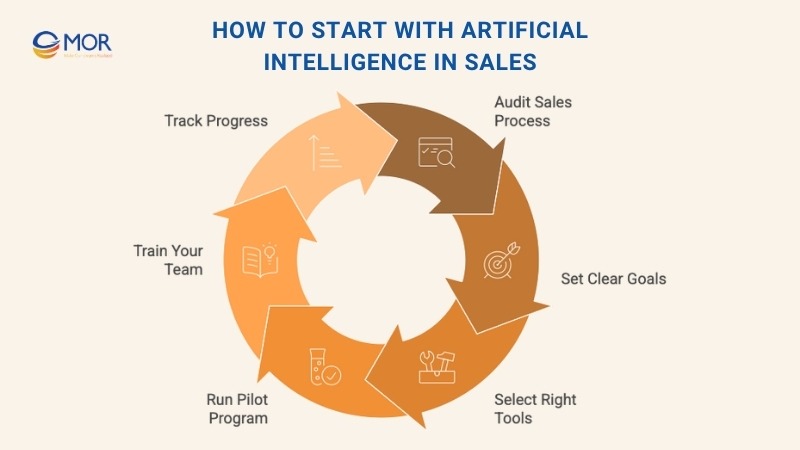
How to Start With Artificial Intelligence in Sales
Challenges and Considerations With Artificial Intelligence in Sales
Even the smartest tools come with a learning curve. Let’s take a closer look at what B2B teams need to watch out for.
Data quality can break everything
AI is only as smart as the data it’s trained on. If your CRM is full of outdated contacts, missing fields, or inconsistent formatting, your AI tool won’t deliver much value. Bad data leads to bad decisions.
Integration isn’t always plug-and-play
Most B2B sales teams use a mix of tools: CRMs, email platforms, call trackers, and dashboards. Getting AI tools to sync with all of them takes time. Some teams underestimate the effort and stall out during implementation.
Cost can be a barrier for smaller teams
While many AI tools are affordable at entry-level, enterprise-grade solutions come with licensing fees, setup costs, and resource needs. For some companies, the ROI only comes after full adoption.
Team resistance slows progress
Sales reps often worry that AI will ‘replace’ their role. Others simply don’t trust the tools. Without clear communication and training, even the best AI tools can sit unused. Change management is just as important as the tech itself.
Automation can feel impersonal
If you're not careful, AI-driven outreach starts sounding robotic. B2B sales still depends on trust and real connection. Overusing automation or relying on generic messaging can turn prospects off fast.
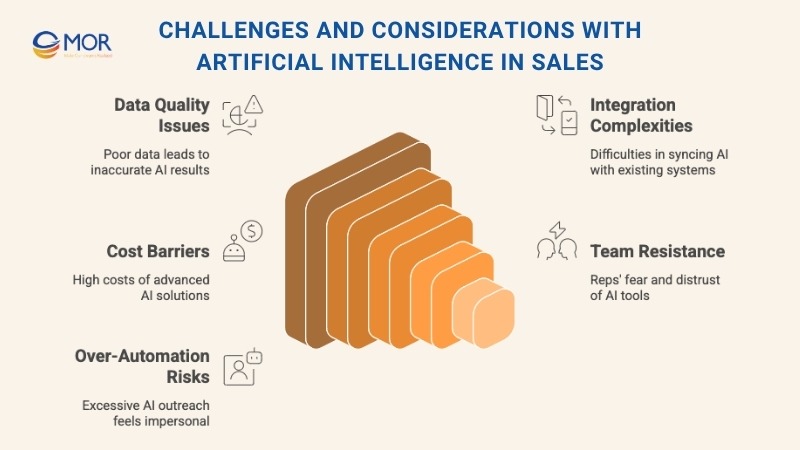
Challenges and Considerations With Artificial Intelligence in Sales
The Future of Artificial Intelligence in Sales for B2B Companies
AI isn’t slowing down. If anything, it’s advancing faster than most teams can keep up. Let’s take a look at where things are heading, so your B2B sales strategy doesn’t fall behind.
GenAI goes beyond personalization
Generative AI can rewrite proposals, craft unique follow-ups, and even tailor product messaging to different stakeholders. What once took hours now takes seconds with far less manual editing. Morgan Stanley forecasts generative-AI revenues soaring from USD 45 billion in 2024 to USD 1.1 trillion by 2028.
Autonomous agents take action, not just suggest
AI is moving from predictive to proactive. Autonomous sales agents can trigger outreach, update CRMs, and schedule meetings without human prompts. Gartner expects 33% of enterprise software to embed agentic-AI capabilities by 2028, allowing software to make 15% of everyday work decisions without human input.
This shift is also expanding opportunities for sales jobs in artificial intelligence, as new roles emerge to manage, fine-tune, and oversee these autonomous systems.
AI-powered RevOps and coaching tools rise
Expect more tools that monitor rep performance, suggest next steps, and even simulate training scenarios. Sales enablement will get smarter and faster. IDC projects global AI spending to reach USD 632 billion by 2028, with sales and marketing tools among the fastest-growing categories.
Emotion AI brings real-time sentiment analysis
AI will soon track tone, hesitation, and buyer sentiment during calls. This feedback gives reps an edge in live conversations, helping them pivot or double down.
B2B teams that prepare now will lead later
Those who treat artificial intelligence in sales as a long-term investment, not just a tech trend, will be best positioned to stay ahead. It’s not about replacing people. It’s about empowering them with sharper tools.
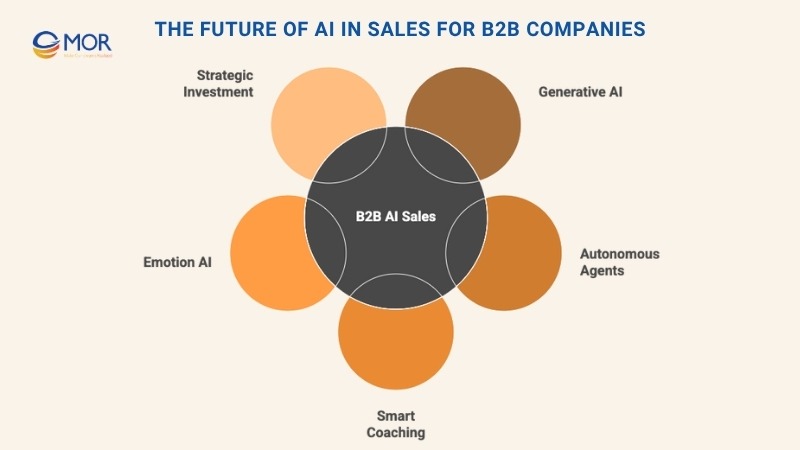
The Future of Artificial Intelligence in Sales for B2B Companies
Conclusion
Artificial intelligence in sales is no longer a future concept. It’s already shaping how B2B companies find leads, engage customers, forecast revenue, and close deals. With smart implementation, the right tools, and strong team alignment, AI can become a core driver of sales growth. The opportunity is big but success depends on how you act now.
Need guidance on where to begin? Contact MOR Software to explore how we can support your AI adoption journey.
Rate this article
0
over 5.0 based on 0 reviews
Your rating on this news:
Name
*Email
*Write your comment
*Send your comment
1